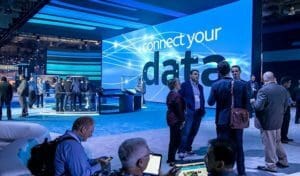Twitter Feed
2018 AT&T Business Summit: Security “in” and “of” the Cloud
While public cloud is undoubtedly an outsized piece of the conversation, news headlines of the latest data breach can make this move a very frightening proposition. The question of how…
My Brush with Royalty: Queen Latifah
Queen Latifah! Hip Hop Icon. Movie Star. Television Star. Fashion Model. Songwriter. Producer. Entrepreneurial Genius!? YES! Dana Elaine Owens, her given name, is co-owner of Flavor Unit Entertainment, a firm that includes…
What’s New in Puppet 5?
Puppet 5 is released and comes with several exciting enhancements and features that promise to make configuration management much more streamlined. This article will take a comprehensive look at these…
5 Reasons Why Ansible is the Best CM Tool Out There?
Amidst volatile markets, dynamic technology shifts, and ever-increasing customer demands, it is imperative for IT organizations to develop flexible, scalable and high-quality applications that exceed expectations and enhance productivity. A…
Machine learning APIs for Google Cloud Platform
Google Cloud Platform (GCP) is considered to be one of the Big 3 cloud platforms among Microsoft Azure and AWS. GCP is widely used cloud solutions supporting AI capabilities to design and…
What Is The Most Important Part of Architecture?
I always find it interesting to hear what people view architecture as. A lot of people think it’s just about the design aspect, where you get to put pen to…
Cloud migration best practice Part 4: Executing the migration
This series has stepped through cloud migration best practices. After providing an overview, we discussed: Classifying business-critical data. Updating organizational IT governance policies. Application screening and cloud workload selection. How to…
Cloud Migration Best Practice Part 3: Application Portfolio Analysis
In part three of this series on cloud migration best practice, I will focus on migrating the application itself. If you haven’t had the opportunity to read our recommendations from part…
Why Use Immutable Storage?
Data has become a global currency, and its value has nowhere to go but up. According to The Economist online, the world’s most valuable resource is no longer oil, but…
CLOUD ACT: What Does That Mean for Your Cloud Storage
When Congress names a law after you, it’s getting serious. That is where we are now with cloud computing. The Clarifying Lawful Overseas Use of Data Act or CLOUD Act (H.R. 4943) is…
In “Cloudy Times”, Markus Klems is having a good discussion on how cloud computing stakeholders classify the various infrastructure options. I then thought that it would be good for me to repeat my input here as well.
When asked this question, I first describe three layers:
- Layer 1 – Hardware virtualization – This is the “bare metal” layer of storage and CPU virtualization
- Layer 2 – Application virtualization – This is when you use web services or APIs to provide a specific function or capability.
- Layer 3 – Process virtualization – This is when you string web services and APIs together to deliver value (function or capability) to an end user
Different infrastructure terms can then be used to describe how these layers are put together:
- Layer 1 is grid computing, utility computing or IaaS. The specific descriptive term is a function of the business model used to deliver the capability
- Layer 1 delivered with layer 2 is PaaS. A developer uses the platform services or APIs to create value for an end user
- Layer 1 delivered with a software application is SaaS
- When Layer 2 and Layer 3 are designed with web services and layered on top of a hardware infrastructure (virtualized or not), you have a Service Oriented Architecture
- Layer 1, 2 and 3 delivered with services and/or APIs already organized in workflows and delivering value to an end user is Cloud Computing.
As always comments or suggestions for improvement are welcomed. The approach is admittedly simplistic, but it does help me sleep at night 🙂
(Update: Michael Sheehan expresses a similar view in Cloud Computing: Introducing the Cloud Pyramid )
Cloud Computing
- CPUcoin Expands CPU/GPU Power Sharing with Cudo Ventures Enterprise Network Partnership
- CPUcoin Expands CPU/GPU Power Sharing with Cudo Ventures Enterprise Network Partnership
- Route1 Announces Q2 2019 Financial Results
- CPUcoin Expands CPU/GPU Power Sharing with Cudo Ventures Enterprise Network Partnership
- ChannelAdvisor to Present at the D.A. Davidson 18th Annual Technology Conference
Cybersecurity
- Route1 Announces Q2 2019 Financial Results
- FIRST US BANCSHARES, INC. DECLARES CASH DIVIDEND
- Business Continuity Management Planning Solution Market is Expected to Grow ~ US$ 1.6 Bn by the end of 2029 - PMR
- Atos delivers Quantum-Learning-as-a-Service to Xofia to enable artificial intelligence solutions
- New Ares IoT Botnet discovered on Android OS based Set-Top Boxes


